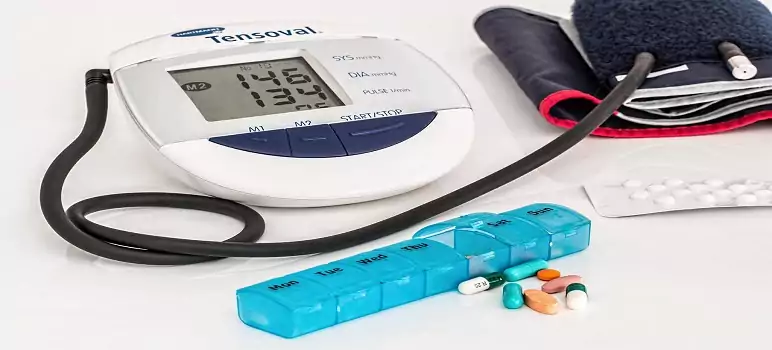What are the Main Causes of High Blood Pressure- Meaning of High Blood Pressure: High blood pressure, also known as hypertension, is a condition in which the pressure of blood against the walls of the arteries is high than normal.
When the heart beats and pumps blood through the body, it causes pressure on the arterial walls. The force with which it does this determines whether or not someone has high blood pressure. Regularly controlled high blood pressure can be managed and treated well.
However, uncontrolled high blood pressure can cause damage to internal organs such as your brain and heart over time. There are several factors that can increase your risk for developing high blood pressure, including genetics, age, diet and lifestyle habits such as smoking and drinking alcohol.
High Blood Pressure is one of the most common diseases worldwide; around 25% of adults have been diagnosed with it by a doctor at some point in their lives.

What are the main Causes of High Blood Pressure
High blood pressure typically develops gradually. It can be caused by unhealthy life decisions, such as not doing enough regular physical activity or taking certain medicines that that increase blood pressure.
Certain Health Conditions Includes:
- Diabetes
- Frequent kidney infections
- Kidney problem
- Narrowing of the kidney-supplying arteries
- Hormone issues such as hypothyroidism, hyperthyroidism, Cushing’s disease, acromegaly, elevated levels of the hormone aldosterone (hyperaldosteronism), and phaeochromocytoma
- Lupus is a disease in which the immune system affects many parts of the body, including the skin, joints, and organs.
- Scleroderma is a disorder that produces thicker skin as well as organ and blood vessel issues.
- Obstructive sleep apnea occurs when the throat walls relax and constrict during sleep, interfering with proper breathing.
- Glomerulonephritis is an infection that affects the small filters inside the kidneys.
Some medicines that can raise your blood pressure include:
- The pregnancy prevention pill
- Steroids
- NSAIDs (non – steroidal anti-inflammatory medicines) such as ibuprofen and naproxen
- Several cough and cold medications from the pharmacy
- Some herbal treatments, especially those containing liquorice
- Cocaine and amphetamines are two examples of recreational drugs.
- Some antidepressants, such as venlafaxine, are selective serotonin-noradrenaline reuptake inhibitors (SSNRI).
Note: When you stop taking the medicine or drug, your blood pressure may return to normal.
Symptoms of high blood pressure
There is only one way to find out if you have high blood pressure: have it measured by a doctor or other health expert. It is simple and painless to check your blood pressure.
Discuss with your health care provider the possibility of measuring your blood pressure at home on a regular basis, commonly known as self-measured blood pressure (SMBP) monitoring.
High blood pressure is known as the “silent killer” since there are usually no warning signs or symptoms, and many individuals are unaware they have it.
You may also like:
- Causes of Gout Disease- Symptoms, Low-Cost Gout Treatment
- 12 Most Common Causes of Kidney Stones and How They Are Treated
- Causes of high cholesterol and triglycerides- How to reduce!
Risk factors of High Blood Pressure
There are numerous risk factors for high blood pressure, including:
Physically inactive

Inactive people have greater heart rates. The higher your heart rate, the harder your heart must work with each contraction and the greater the force on your arteries. Overweight is also increased by a lack of physical activity.
Age
As you become older, your chances of developing high blood pressure rise. High blood pressure is more common in men until about the age of 64. After the age of 65, women are more prone to have high blood pressure.
Obesity or being overweight
The more blood you require to deliver oxygen and nourishment to your tissues, the more weight you have. The pressure on your artery walls increases as the amount of blood flowing through your blood arteries grows.
Family history
High blood pressure often runs in families.
Consumption of Tobacco
Smoking or chewing tobacco not only momentarily raises your blood pressure, but the chemicals in tobacco can also damage the lining of your artery walls. This can induce artery narrowing and raise your risk of heart disease. Secondhand smoke can also increase your risk of developing heart disease.
Excessive salt (sodium) in your diet
Excess salt in your diet might cause your body to retain fluid, raising your blood pressure.
Your diet contains insufficient potassium
Potassium aids in the balance of sodium in your cells. A stable potassium balance is essential for good heart health. Sodium can build up in your blood if you don’t get enough potassium in your food or if you lose too much potassium due to dehydration or other health issues.
Stress
High amounts of stress might cause a brief rise in blood pressure. Stress-related behaviours such as eating more, smoking, or drinking alcohol can cause blood pressure to rise even higher.
Certain chronic conditions
Chronic conditions such as kidney disease, diabetes, and sleep apnea may further increase your risk of high blood pressure.
Pregnancy might also lead to high blood pressure. Although adults are more likely to have high blood pressure, children may also be at risk. High blood pressure in some youngsters is caused by kidney or heart disorders. Poor lifestyle habits, such as an unhealthy diet and lack of exercise, lead to high blood pressure in an increasing number of children.
Treatment of High Blood Pressure

Everyone who has high blood pressure should adopt healthy lifestyle improvements.
Your blood pressure reading and your risk of developing problems such as heart attacks or strokes will determine whether medication is also recommended.
Your doctor will perform several blood and urine tests, as well as ask you questions about your health, to determine your risk of developing other problems:
- If your blood pressure is consistently higher than 140/90mmHg (or 135/85mmHg at home), but your risk of other problems is modest, you should adopt some lifestyle improvements.
- If your blood pressure is persistently higher than 140/90mmHg (or 135/85mmHg at home) and your risk of other problems is high, you will be prescribed blood pressure medication as well as lifestyle improvements.
- If your blood pressure is routinely higher than 160/100mmHg, you will be prescribed blood pressure medication as well as lifestyle improvements.
Lifestyle Improvement
There are certain lifestyle improvements you could do to lower your blood pressure. Some of these will reduce your blood pressure in weeks, while others will take longer.
Your Healthy Lifestyle should Aim to:
- Limit your daily salt intake to less than 6g (0.2oz), or approximately a teaspoonful – learn how to reduce the amount of salt in your diet.
- Consume a low-fat, well-balanced diet that includes plenty of fresh fruits and vegetables.
- Reduce weight – Use the BMI healthy weight calculator to determine your ideal weight, and then read about losing weight if you’re overweight.
- Reduce Caffeine intake, it is found in coffee, tea, and cola.
- Stop smoking and ask for help in stopping.
- Reduce your alcohol consumption by downloading a drinks diary and keeping track of your drinking.
You can start taking these steps right away, whether or not you use blood pressure medication. In fact, by implementing these improvements early on, you may be able to prevent the need for medicines.
Medicines to Reduce High Blood Pressure
A lot of medications can be used to help reduce high blood pressure. Many patients may take a combination of medications.
- If you are under the age of 55, you will most likely be prescribed an ACE inhibitor or an angiotensin-2 receptor blocker (ARB).
- If you are 55 or older, you will most likely be prescribed a calcium channel blocker.
You could be need to take blood pressure medication for the rest of your life. However, if your blood pressure remains stable for several years, your doctor may be able to reduce or discontinue your treatment.
It is essential to take your medication exactly as prescribed. It will not work as well if you miss doses. The medicine will not necessarily make you feel better, but that does not mean it is ineffective.
Medicines used to treat high blood pressure can cause adverse effects, but the majority of people do not experience any. If you experience side effects, do not discontinue your medication. Consult your doctor, who may urge you to change your medication.
You may also like:
- Causes of Migraine in Male, Female- Types of Migraines and Symptoms, treatment
- 12 Causes of Nose Bleeding | 11 Best ways to prevent nose bleed
- Can Bad posture cause chest pain and shortness of breath?
High Blood Pressure in Older Adults
When measured in a clinic or hospital, the target blood pressure measurement for people over the age of 80 is less than 150/90 mmHg, and less than 145/85 mmHg at home.
While there are evident benefits to using blood pressure medications if you are under the age of 80, it is less clear if you are above 80.
It is now regarded that if you reach the age of 80 while taking high blood pressure medication, you should continue taking it as long as it is still benefitting you and not causing side effects.
If you have high blood pressure and are over the age of 80, your doctor will evaluate your other health risk factors when considering whether to treat your high blood pressure.
So, here is the article on ‘What are the main Causes of High Blood Pressure’, hope you enjoyed it.